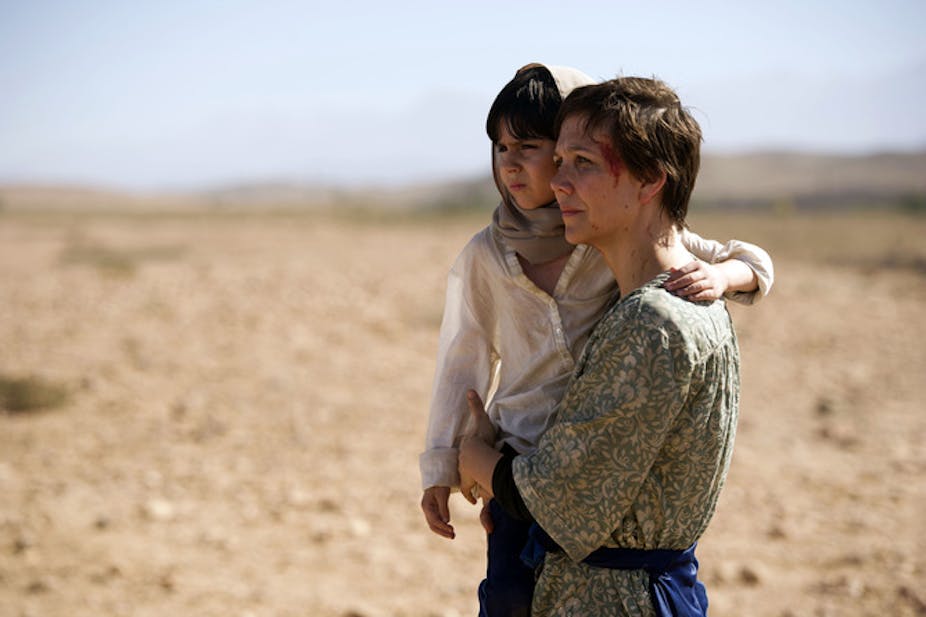Warning: this article contains spoilers.
From its haunting opening scene, The Honourable Woman grips with its riveting, beautifully crafted sequences and some gloriously witty lines. The BBC’s eight-episode spy thriller, which has just concluded, might take time to gather pace, but by episode four it’s utterly compelling, and the eighth and final instalment by no means disappoints.
As a professor of Middle Eastern Policy Studies, I always experience a certain wariness before watching films or TV dramas that relate to my area of study. What’s going to grate? Quite how much will they have got wrong?
But The Honourable Woman got a lot right. I found the plot absolutely plausible. I’ve spent much of the past 25 years studying conflict in the Middle East, and the Israeli-Palestinian conflict in particular. And I found almost all of the depictions of the main protagonists to be recognisable.

But that said, I would have predicted that the molten-faced villain Saleh Al-Zahid (Philip Arditti) might in fact be an Israeli, rather than a Palestinian foot soldier masquerading as one.
And initially I was unsure about Atika. It wasn’t until she came into her own in the final episodes as the extraordinarily committed Palestinian activist that her character made sense. But then I found myself wondering how she possibly could have maintained her cover through all those months in captivity in Gaza as the sole companion and cell-mate of the lead, Nessa Stein, played by the disarmingly beautiful Maggie Gyllenhaal.
But these were my only gripes. An American spy (Monica Chatwin, played very effectively by Eve Best) sat at the centre of the spider web, ruthlessly pursuing her own ends. Yet what made the plot so plausible was not the identity of the mastermind, but that the programme presented subterfuge and the vaunting ambition of key individuals as the real determinants of whether peace is attained, and how. In my experience, the prospect of being the one to claim the credit for designing the future is more of a driver for those pulling the strings than any concept of statesmanship or morality.

I came to this conclusion when seeking an explanation for why US Secretary of State John Kerry thought he could succeed where so many others had failed in the never-ending Middle East Peace Process. Veteran commentators told me the answer was simple: ego. It was the very fact that so many others had failed before him that was the source of Kerry’s ill-placed self-belief. The same might be said of Tony Blair.
And herein lies one of the central messages of this mini-series, one that translates out of its fictional realm. The landscape of the Israel-Palestine conflict is over-populated with ambitious individuals trying to devise solutions. But the benefits they expect to accrue in the role are bigger drivers than peace itself. They therefore fail to look for the most significant factors which drive people to act the way they do, such as the pernicious effects of pain and anger on ordinary people and the desire for revenge – revealed in the last episode to be at the heart of The Honourable Woman.
And so the stoically ethical heroine of the piece, Nessa Stein, is a tragic figure who is eventually revealed to be only a pawn – her elimination the means required to realise Palestinian ambitions for statehood, and American power. In Nessa’s character we see depicted the idealism and naiveté of the “do-gooders”, who seemingly seek peace for its own sake.

She, too, initially at least, seems overly confident and ambitious. But this collapses when we see her character humiliated and traumatised as a pawn in a much bigger plot from which her inordinate wealth and glamour cannot protect her. This is the thread that ties her fate to that of Atika, and it is the courage that both women show in defending each other and the child Kassim, that is the antidote to despair.
Without Atika as a counterpoint, Nessa would be implausible and even irritating. But between them they deliver a message of strength and conviction which holds out and actually gathers momentum amid the self-regarding machinations of business leaders and spies.
The sheer number and variety of strong female characters depicted in the series is positively refreshing, and the show’s writer and director, Hugo Blick, is to be further complimented on the skill with which he avoids apportioning undiluted blame to either side. Let the Americans be the culprits. Why not, they can handle it. Satisfyingly (and unsurprisingly, I guess) the winners are the British spooks, the portrayal of whom is, to me, the most mischievous and enjoyable feature of the series.

